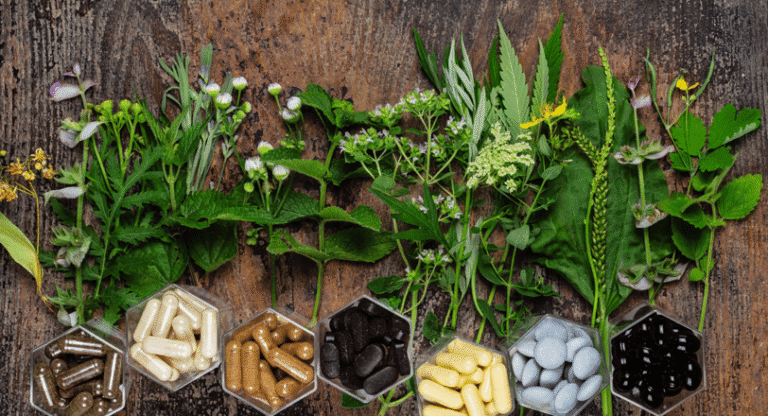Delve into the rise of natural GLP-1 supplements, promising weight loss with exotic ingredients like Hoodia gordonii and African mango extract. This must-read guide for women explores the safety concerns, the importance of protein, and how these over-the-counter alternatives compare to prescription drugs. Learn about potential benefits, risks, and why caution is key when considering these trendy weight-loss aids.
Hey there, ladies! Have you heard the buzz about these new “natural” GLP-1 supplements hitting the market? They’re being touted as a safer, over-the-counter alternative to prescription weight-loss drugs like Ozempic. Who wouldn’t want to shed pounds without needing a doctor’s note? But before you jump on the bandwagon (or empty your wallet), let’s dig into these supplements, how they work, and whether they’re worth your hard-earned cash. Spoiler alert: It’s not all sunshine and rainbows, but there’s some promising stuff here too.
What Is GLP-1, and Why Should You Care?
First things first, let’s get on the same page about GLP-1. Don’t worry; I won’t bore you with a science lecture. GLP-1 (glucagon-like peptide-1, if you’re feeling fancy) is a hormone your body naturally produces. It’s like your internal “stop eating” signal—helping regulate appetite, slow digestion, and control blood sugar. Prescription drugs like Ozempic mimic this hormone, making you feel full faster and crave less food. The result? Weight loss is often pretty significant.
These natural supplements claim to boost your body’s GLP-1 production, potentially offering similar benefits without the prescription. Sounds like a dream, right? But hold on—there’s a catch (isn’t there always?).
The Safety and Regulation Reality Check
Here’s the thing: Over-the-counter supplements aren’t held to the same strict standards as prescription drugs. While Ozempic and its cousins have been through rigorous testing to prove they’re safe and effective, natural GLP-1 supplements? Not so much. They’re regulated more like food than medicine, so companies don’t have to prove they work or are safe before selling them.
So, what does that mean for you? Well, you might be rolling the dice. Some of these supplements could be great, but others might be duds—or worse, cause side effects. Speaking of which, some women have reported nausea, bloating, or even more serious issues like dehydration. And let’s not forget, if you’re already on meds (especially for diabetes or blood sugar issues), these supplements could interact in ways you didn’t expect. Bottom line: Approach cautiously, and maybe chat with your doctor before diving in.
Protein: Your Secret Weapon (and Why You Might Be Missing It)
Okay, let’s pivot for a second because I know you’re here for weight loss, but I’d be doing you a disservice if I didn’t talk about protein. If you’re trying to slim down, you might be cutting calories left and right—but don’t skimp on protein! It’s your BFF for maintaining muscle, keeping your energy up, and supporting healthy hair and nails. Trust me, no one wants to lose weight only to end up with limp hair and brittle nails.
If you’re feeling sluggish, noticing more hair in your brush, or struggling to recover after workouts, it might be a sign that your protein intake is too low. Here are some symptoms to watch for:
– Fatigue: Like, can’t-even-get-off-the-couch tired.
– Muscle Weakness: Suddenly, your grocery bags feel like boulders.
– Brittle Hair or Nails: More split ends than a rom-com breakup montage.
– Slow Healing: That paper cut just won’t quit.
– Mood Swings: The hanger is accurate, but not particularly attractive.
So, while focusing on weight loss, ensure you’re getting enough protein—aim for about 1.2 to 1.5 grams per kilogram of body weight daily. Your body (and your hair) will thank you.
Natural GLP-1 Boosters: What’s Inside and Do They Work?
Now, let’s get to the good stuff: the ingredients in these natural GLP-1 supplements that are supposed to help you lose weight. While they’re not magic pills, some have legitimate science behind them. Here are a few you’ll likely see on labels:
– Berberine: This one’s a fan favorite. It’s been shown to help regulate blood sugar and might support weight loss by improving insulin sensitivity. Think of it as a gentle nudge to your metabolism.
– Green Tea Extract: You’ve probably heard of this one. It’s packed with antioxidants and known for boosting metabolism. Plus, it might help your body burn fat more efficiently, especially when paired with exercise.
– Fiber (like Glucomannan): Fiber is your friend for feeling full. Glucomannan, in particular, expands in your stomach, helping you feel satisfied with less food. It’s like a natural appetite suppressant.
– Chromium: This mineral helps regulate blood sugar and might curb cravings, especially for carbs. This could be a game-changer if you’re a stress-eater (hi, me too).
– Saffron Extract: A bit of a wildcard, but some studies suggest it can reduce appetite and improve mood. And let’s be honest, anything that helps with emotional eating is worth a look.
Let’s spice things up with some exotic natural ingredients that might be your new secret weapons in the battle of the bulge. First up, Hoodia gordonii—a succulent from South Africa that the San people have used for centuries to suppress hunger during long hunts, making it a standout natural appetite buster. Then there’s garcinia cambogia, a tropical fruit from Southeast Asia loaded with hydroxy citric acid, which may help block fat production and keep those cravings in check. How about forskolin? Sourced from the Indian coleus plant, it’s got the potential to boost lean muscle and melt fat. It’s pretty cool. And don’t sleep on African mango extract, a rising star from West Africa linked to weight loss and a revved-up metabolism. These far-flung finds might sound like they belong in a wellness retreat, but they’re worth a try if they can help you dodge that extra scoop of ice cream. Remember, supplements and spices are your trusty sidekicks on your health and weight loss adventure, not miracle workers!
Do these ingredients work? Well, they won’t melt away 20 pounds overnight (sorry to burst that bubble). But they can push your weight-loss efforts in the right direction, especially with a healthy diet and exercise. Supplements can also reduce cravings and stabilize blood sugar, helping you establish more nutritious eating habits. This can lead to more energy throughout the day and gradual weight loss. Remember, supplements are a supportive tool, not a standalone solution—consistency with a balanced lifestyle is key to seeing results.
“Natural” vs. Prescription: Managing Expectations
If you are looking for a way to shed some extra pounds without the risks of prescription drugs, natural supplements might be worth considering, especially if you’re wary of the powerful effects—and potential downsides—of prescription GLP-1 medications like Ozempic and Wegovy. These drugs have gained attention for their ability to help people lose up to 15% of their body weight, sometimes even more.
However, that impressive impact comes with a catch: side effects that can include uncomfortable gastrointestinal issues like nausea, vomiting, diarrhea, and constipation, as well as rarer but more serious risks such as pancreatitis or thyroid problems and even vision loss. In contrast, natural supplements offer a gentler approach with less drastic results, but typically have fewer risks and side effects. If you’re not eligible for prescription meds or prefer to steer clear of their side effects, a high-quality natural alternative could be a practical starting point.
The Bottom Line: Supplements Are Just One Piece of the Puzzle
These natural GLP-1 supplements can be helpful tools, but they’re not a magic solution. If you want actual, lasting results, you’ve got to pair them with a balanced diet (hello, protein!) and increased activity. Think of them as the cherry on top of your wellness sundae, not the whole dessert.
And remember, always chat with your doctor before starting any new supplement, especially if you’re already on meds or have health concerns. Your safety comes first, always.
So, are these natural GLP-1 supplements worth it? Maybe. But only if you’re ready to put in the work to make them part of a more significant, healthier lifestyle. Now, crush those goals—you’ve got this!
Disclaimer: Before changing your wellness routine, check in with your healthcare provider, especially if you have medical conditions or medications. Stay safe and sip smart, ladies!
I share and promote top-rated products via affiliate links. If you make a purchase, I earn a small commission at no extra cost to you. Thank you for supporting my work while you snag something extraordinary for yourself!

